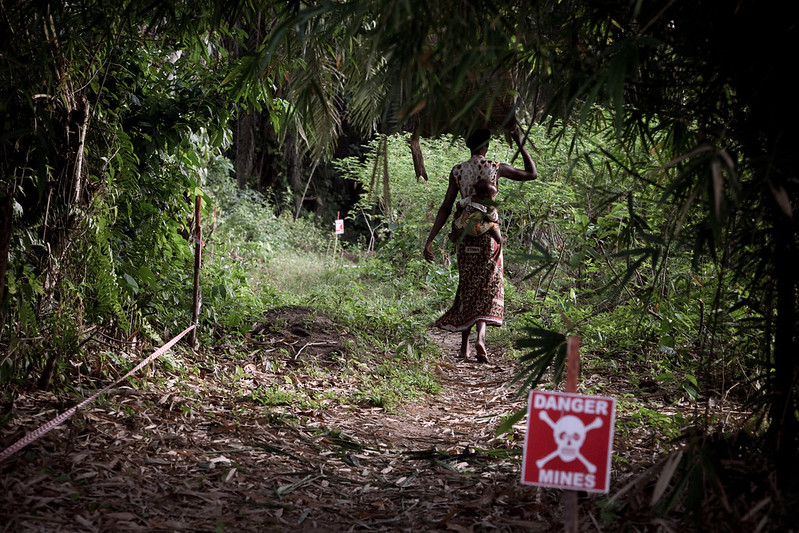 This article is part of ASPI’s 2020 series on women, peace and security.
This article is part of ASPI’s 2020 series on women, peace and security.
October will mark 20 years since the UN Security Council first recognised the links between international peace and security and the equal rights of women and girls. Landmark UNSC
resolution 1325 established the right of women to engage in issues of war and peace, and recognised the role that women play in preventing, managing and recovering from conflict.
At the same time, the resolution highlighted how conflict affected women and girls differently to men and, accordingly, how crisis management, humanitarian and development responses needed to take account of the specific needs of women and girls.
This resonates in the time of the coronavirus pandemic, which has revealed both the global scale of domestic and gender-based violence and the distinct ways in which women, who dominate child, aged-care and home-care jobs, are impacted by health crises.
Yet, it’s striking that a resolution about armed conflict has little to say about weapons. Apart from two brief references to the need for gender-sensitive mine action and disarmament, demobilisation and reintegration programs, UNSCR 1325 does not address the rights and roles of women in regulating arms.
It was not until 2013,
driven by the experiences of women in civil conflicts in west and central Africa, that a connection between small arms and women’s welfare was formally made.
The Arms Trade Treaty requires states to take account of the risk of weapons being used to carry out gender-based violence. And while assistance to victims of mines and cluster munitions now incorporates gender-sensitive provisions, the role of women in disarmament is still not a mainstream part of the women, peace and security agenda.
One reason for this disconnection is the specialist and traditionally male-dominated nature of arms control. When UNSCR 1325 was adopted, women
comprised only 15% to 20% of diplomats participating in arms control conferences and negotiations.
Twenty years later, women now constitute around 30% of participants in disarmament policy forums, well behind other areas of diplomacy, in a profession that often puts a premium on technical knowledge, continuity and long-term career commitment.
Gender stereotypes also play a role in casting women as peace-loving, weak and in need of protection, and men as strong, assertive and capable of negotiating arms control agreements. More fundamentally, as protests against racism and police brutality illustrate, exploring how weapons impact specific communities or groups raises challenging questions about power structures and the militarised, hyper-masculine ways in which security is defined and pursued.
Yet weapons shape how we wage war. The development, transfer and use of arms enable and drive the conflicts and violence experienced by women. If we want to reduce the impact of armed violence on women, the regulation of weapons must be part of the WPS agenda.
A sustained conversation is now underway on how to increase
women’s participation in disarmament at all levels. A number of countries, including Australia, are beginning to explore how gender analyses can be incorporated into disarmament frameworks and policies. These are important first steps. But to normalise the use of gender perspectives in weapons governance and translate the WPS agenda into practical and effective arms control, further action in three areas is required.
First, the agenda must be expanded to all areas of disarmament. Demands for gender equality and analysis in arms control cannot be limited to the regulation of small arms and light weapons. The WPS agenda is equally relevant to weapons of mass destruction, for example.
With a new appreciation of the risks of biological pathogens, next year’s Biological Weapons Convention review conference will be a critical opportunity to incorporate gender considerations into bio-safety and risk management.
Gender is also missing from multilateral discussions about the security implications of technologies, particularly cyber and artificial intelligence. Promoting women’s engagement in the traditionally male fields of science, technology, engineering and mathematics; addressing biases—conscious or unconscious—in data and programming; and exploring the different ways in which cyberattacks impact people can help introduce gender awareness and gender perspectives into discussions on how to regulate technologies that can be weaponised.
Second, gender expertise must be brought into disarmament discussions. Many arms control practitioners admit that they lack the expertise and tools to address the impact of weapons on women and broader gender issues. The WPS agenda has shown that gender know-how can be built in security institutions, policies and practice.
Bringing gender experts into arms control meetings and national delegations can help kick-start the process. Putting systems in place to collect gender-disaggregated data on weapons at national and international levels can provide the evidence base for targeted arms control policies.
Third, arms control must be integrated into the WPS agenda. Twenty years on, many argue that it is time for UNSCR 1325 to go beyond a focus on armed conflict to the violence faced by millions of women around the world in their homes and communities. To do so means addressing the connection between international security issues, such as illicit arms flows, and issues usually considered ‘domestic’, such as urban violence and the persistent lack of accountability for gender-based violence.
Of the 84 countries that have developed
national action plans on resolution 1325, only one-third include arms control and disarmament measures. Integrating arms control issues into these plans can help translate the WPS agenda into practical domestic as well as international contexts.
Breaking down the silos between women and weapons agendas and communities will not be easy. The social, political, cultural and knowledge barriers are high, but progress in each of those areas depends on it. Now is the time to try.
 Print This Post
Print This Post